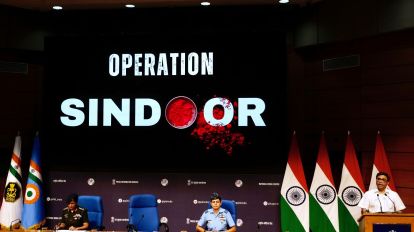Syllabus:
GS3: Security challenges and their management in border areas – linkages of organized crime with terrorism.
Context:
Indian Armed forces carried out precision strikes at 9 terrorist infrastructure in Pakistan and Pakistan-occupied Jammu and Kashmir from where terrorist attacks against India have been planned and directed.
More on the news:
- As per the Indian officials these actions have been focused, measured and non-escalatory in nature.
- In strikes no Pakistani military facilities were targeted and India has shown considerable restraint in selection of targets and method of execution.
- These steps come in the wake of the barbaric Pahalgam terrorist attack in which 25 Indians and one Nepali citizen were murdered.
Unfolding of events:

- On April 22, 2025, Pakistani and Pakistan-trained terrorists belonging to the Lashkar-e-Taiba carried out a savage attack on Indian tourists at Pahalgam in Jammu & Kashmir in India.
- This attack caused the largest number of civilian casualties in a terrorist attack on Indian soil since the 26th November 2008 attacks in Mumbai.
- The attack was clearly driven by the objective of undermining the normalcy returning to Jammu & Kashmir.
- In particular, it was designed to impact the mainstay of the economy, tourism, with a record 23 million tourists visiting the valley last year.
- The calculation, presumably, was that harming growth and development in the Union Territory would help keep it backward and create fertile ground for continued cross-border terrorism from Pakistan.
- A group calling itself The Resistance Front (TRF) had claimed responsibility for the attack. This group is a front for the UN-proscribed Pakistani terrorist group, Lashkar-e-Taiba.
- India had given inputs about the TRF in the half-yearly report to the Monitoring Team of the UN’s 1267 Sanctions Committee in May and November 2024, bringing out its role as a cover for Pakistan-based terrorist groups.
- India’s actions should be seen as consistent with international counterterrorism mandates.
- This follows up after the UN Security Council’s recent statement on the Pahalgam attack, which called for holding perpetrators and sponsors accountable.
Operation Sindoor:
Operation Sindoor was carried out between 1:05 am and 1:30 am on late night 7th May, was aimed at terrorist infrastructure in Pakistan and Pakistan-occupied Kashmir.
Indian forces used “niche technology weapons” and selected warheads carefully to ensure that only intended targets were hit.
The government said it struck the headquarters belonging to Lashkar-e-Taiba and Jaish-e-Mohammed.
- Bahawalpur, which is home to Jaish and its leader Masood Azhar, and Muridke, linked to Lashkar and its founder Hafiz Saeed, were among the cities targeted.
- These groups have been tied to some of the deadliest terror attacks in India, including the 2008 Mumbai attacks and the recent massacre in Pahalgam.
This Operation Sindoor should be seen as a calibrated strike intended to deter further cross border terrorism on Indian soil.

